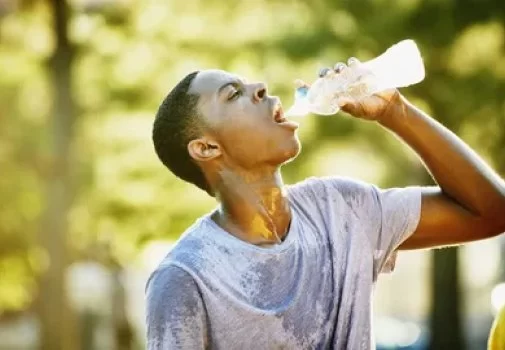- 1 - #understanding-dehydration - Understanding Dehydration and Its Effects on Your Heart
- 2 - #importance-of-hydration - The Importance of Staying Hydrated for Heart Health
- 3 - #tips-for-prevention - Tips for Preventing Dehydration and Keeping Your Heart Efficient
- 4 - #hydration-and-heart - How Hydration Directly Affects Heart Function
- 5 - #real-life-stories - Real-Life Stories of Heart Health and Dehydration
- 6 - #ongoing-care - Ongoing Care and Lifestyle Adjustments for Better Heart and Hydration Health
1. Understanding Dehydration and Its Effects on Your Heart
Dehydration occurs when your body loses more fluids than it takes in, resulting in an insufficient amount of water to carry out normal functions. This can have a severe impact on your heart, as the heart and other organs rely heavily on water to function properly. Dehydration can lead to lowered blood volume, making it harder for your heart to pump blood efficiently. This can cause an increased heart rate, higher blood pressure, and strain on the cardiovascular system.
The effects of dehydration on heart efficiency are especially concerning for those with preexisting heart conditions. For example, dehydration can worsen conditions like heart failure and arrhythmias (irregular heartbeats). Therefore, it is essential to recognize the symptoms of dehydration early and take steps to prevent it.

2. The Importance of Staying Hydrated for Heart Health
Hydration is vital for overall health, and its role in maintaining heart efficiency cannot be overstated. Water is crucial for transporting nutrients, regulating body temperature, and keeping blood at the proper viscosity. Proper hydration helps to maintain the volume of blood, allowing the heart to pump more effectively and efficiently. This reduces the strain on the heart and helps to maintain healthy blood pressure.
Atlanta Heart Specialists
atlanta heart specialists
4375 Johns Creek Pkwy #350, Suwanee, GA 30024, USA

Blood Circulation and Hydration
When your body is well-hydrated, your blood vessels remain flexible and capable of transporting oxygen and nutrients to vital organs, including the heart. On the other hand, dehydration causes the blood to thicken, which can lead to increased strain on the heart as it works harder to circulate thicker blood. Staying hydrated helps your body maintain smooth circulation, reducing the likelihood of clots and strokes.
Prevention of Cardiovascular Strain
Proper hydration also prevents excess cardiovascular strain by ensuring the heart does not have to work overtime to pump thicker blood. Dehydration can lead to elevated heart rates as the body compensates for the decreased blood volume, increasing the risk of heart-related issues. Thus, it’s important to maintain a proper balance of fluids to support overall cardiovascular function.
3. Tips for Preventing Dehydration and Keeping Your Heart Efficient
Preventing dehydration and maintaining heart efficiency is not only about drinking water but also making lifestyle choices that promote overall health. Here are some practical tips:
1. Drink Plenty of Fluids Regularly
The most straightforward way to prevent dehydration is to drink water consistently throughout the day. Aim for at least 8 glasses (64 ounces) of water daily, though individual needs can vary based on factors such as activity level, climate, and body size. Ensure you drink more if you're engaging in physical activity or during hot weather.
2. Include Electrolytes in Your Hydration Routine
Electrolytes like sodium, potassium, and magnesium play a key role in fluid balance, nerve function, and muscle contraction. When you’re dehydrated, you lose essential electrolytes, which can negatively affect heart function. To help maintain hydration, consider drinks with added electrolytes or eat foods rich in these nutrients, such as bananas, avocados, and leafy greens.
3. Avoid Caffeinated and Alcoholic Beverages
Caffeine and alcohol can increase urination, leading to a higher risk of dehydration. If you consume caffeinated or alcoholic beverages, balance them by drinking additional water to compensate for fluid loss. Opt for water or electrolyte-rich drinks if you’re in an environment that causes excessive sweating or during long periods of exercise.
4. Monitor Your Body’s Signals
Be aware of your body’s signals, including thirst, dry mouth, dark yellow urine, and fatigue, which can indicate dehydration. It’s essential to address these signs promptly by drinking water and replenishing fluids. If you experience dizziness, confusion, or rapid heart rate, seek immediate medical attention, as these can be signs of severe dehydration affecting heart function.
4. How Hydration Directly Affects Heart Function
Hydration and heart function are intricately linked. When your body is well-hydrated, your heart can pump more effectively, allowing blood to flow efficiently throughout the body. This not only ensures that the heart gets the oxygen and nutrients it needs but also prevents unnecessary strain on the cardiovascular system.
How Dehydration Affects the Heart
When you’re dehydrated, your blood volume decreases, making it harder for the heart to pump blood. This leads to an increase in heart rate and a higher risk of cardiovascular issues. Additionally, dehydration can cause your blood pressure to fluctuate, leading to long-term damage to blood vessels and the heart. Therefore, maintaining optimal hydration levels is essential for heart health.
5. Real-Life Stories of Heart Health and Dehydration
Many people have experienced the impact of dehydration on their heart health, with some even discovering that staying hydrated is a simple yet effective solution to reducing heart-related issues. One example is a patient named Sarah, who suffered from frequent episodes of dizziness and palpitations. After her doctor advised her to improve her hydration habits, she noticed a significant improvement in her overall health and energy levels.
In another case, a professional athlete named John was advised to drink water consistently during his workouts to keep his heart functioning optimally. Despite sweating heavily during exercise, John found that proper hydration not only helped him perform better but also reduced the risk of heart strain. His story highlights the importance of hydration in maintaining heart efficiency, particularly during physical exertion.
6. Ongoing Care and Lifestyle Adjustments for Better Heart and Hydration Health
In addition to daily hydration practices, ongoing care and lifestyle adjustments are vital for keeping your heart healthy. Maintaining a balanced diet, getting regular exercise, and avoiding smoking and excessive alcohol consumption are key factors that contribute to heart health. By incorporating these habits, you can support both your hydration levels and your cardiovascular function, ensuring long-term heart efficiency.
For more tips and personalized recommendations on hydration and heart health, visit HeartCare Hub for expert advice, products, and services designed to promote heart wellness and overall health.





















Deborah Heart and Lung Center
deborah heart and lung center
200 Trenton Rd, Browns Mills, NJ 08015, USA